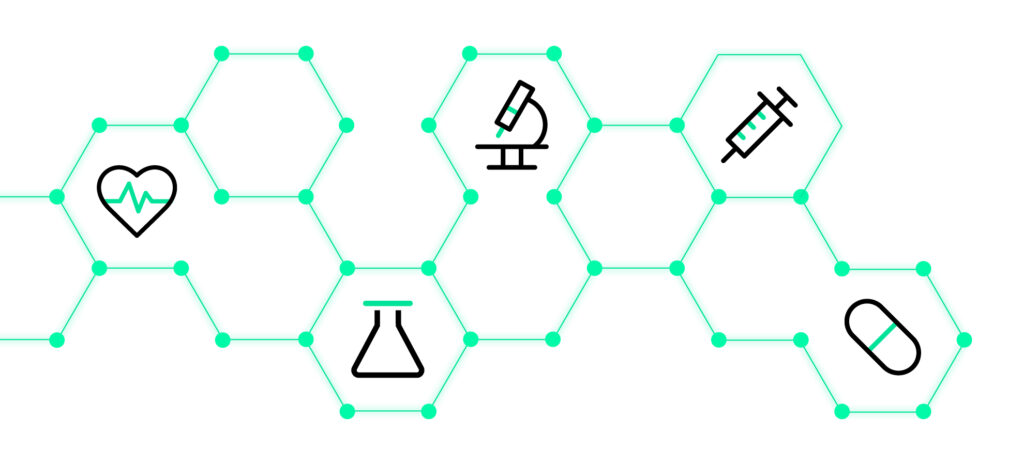The term big data refers to the volume, variety, and velocity of information that industries can mine to gain actionable insight into their operations. Big data and analytics for pharma give companies the ability to process and interpret this information, and this ability is contributing to the increased use of big data in the pharma industry. Therefore, it’s not surprising that healthcare and pharmaceutical companies made nearly $5 billion in big data investments in recent years.
Pharmaceutical companies have long relied on data to identify patterns, test theories, and understand the efficacy of treatments. In this article, we’ll examine how big data analytics helps pharmaceutical companies streamline complex business processes and improve efficiency throughout the product development lifecycle.
What is the role of big data in drug discovery?
Drug development is a time-consuming process, with companies conducting years of clinical research and multiple rounds of clinical trials to ensure safety and efficacy. But pharma companies also have a relatively short time to earn a return on investment, with drug patent life spanning just 20 years. These pressurized timelines and other threats to the pharmaceutical industry mean that demand is high for innovative solutions that accelerate the development process.
Artificial intelligence – intelligence demonstrated by machines, as opposed to the natural intelligence demonstrated by humans – can draw insights and surface key results from large data sets like the ones found in pharma research and development. However, the process of integrating formerly siloed data sets and analyzing them can be challenging. For such efforts to succeed, pharma companies must prioritize internal collaboration among discovery, clinical development, and medical affairs.
Big data in pharma research and development
Big data offers several benefits for pharma companies during the R&D stage:
- Predictive modeling that can unearth targets for the drug pipeline
- Statistical tools to improve patient recruitment and enhance monitoring
- Data mining of public forums and social media sites to identify adverse drug reactions not formally reported
These are compelling reasons to leverage big data analytics, but pharmaceutical organizations must first prepare themselves to get the most out of their efforts. McKinsey suggests a multi-step approach, with the goal being to tackle the most important data first. The recommended workflow includes:
- Prioritize specific types of clinical data to address
- Create additional data-warehousing capabilities as needed
- Develop an approach for next levels of priority data, including:
- Scenario analysis
- Ownership
- Expected costs and timelines
Following data prioritization and integration, internal and external collaboration are the next steps to unlock big data’s potential in pharma. Life science teams can look to integrated data to enable improved connectivity between different functions, increase operational efficiency, and yield new insights and potential opportunities. When it comes to compliance in the pharma industry, big data analytics and the use of transcripts generated in a virtual advisory board session can also help ensure that information required by regulatory agencies is safely stored and easily accessible. By staying on top of regulatory affairs in the pharma industry, organizations can streamline submission processes and reduce overall compliance risk.
Big data in clinical trials and precision medicine
Clinical trials were under public scrutiny last year as the world eagerly awaited the development of a COVID-19 vaccine. These trials had the benefit of urgency, overwhelming support, and a large patient pool. But outside of this extreme example, trials are costly and time-consuming to run and can fail without proper patient recruitment and retention.
With big data analytics, pharma companies can more accurately recruit the right patients for clinical trials by using patient data such as genetic information, personality traits, and disease status. This technology can also enable precision medicine, in which diagnosis and treatment of disorders are carried out using relevant patient data on genetic make-up, behavioral patterns, and other key factors.
Nicholas Borys, chief medical officer of biotechnology company Celsion, says that one of the most difficult parts of his job is enrolling patients into studies. If this difficulty could be overcome, it could change how life-threatening diseases are treated or even cured. With just 10% of cancer patients, for example, enrolled in clinical trials, there is opportunity to create better results by recruiting more patients. “If we could get that up to 20% or 30%,” says Borys, “we probably could have several cancers conquered by now.” Applying big data analytics to patient recruitment could potentially mean larger, more accurate patient pools, better data quality, and more successful trials.
It’s worth noting, though, that this type of disruptive innovation in pharma is not a one-size-fits-all solution. According to the National Institutes of Health: “However, big data is not a panacea without limitations. [A big-data clinical trial] is a kind of observational study in nature and has inherent limitations of its kind. For example, the observed and un-observed baseline characteristics cannot be well balanced. The conclusion may not be generalizable to other institutions if data were collected from a single center. Such limitations can be addressed with advanced statistical methods such as the random-effects model and bootstrap estimation of coefficients.”
Big data in pharma sales and marketing
The application of big data analytics in the pharmaceutical industry has implications beyond drug development and clinical trials. With increasing competition in the life science space, pharma organizations or pharmaceutical manufacturers must be more targeted in their analysis to drive effective sales and marketing operations. Per technology consulting firm Intone, “By analyzing the information from social media, demographics, electronic medical records, and other sources of data, pharma companies…can also analyze the effectiveness of sales efforts and make key decisions in their marketing and sales strategies.”
Insights management and big data
Pharmaceutical teams across the organization are increasingly turning to big data analytics to accelerate their work. In the Within3 insights management platform, teams can use network analytics to identify the right experts for every project, using a more precise evaluation of influence networks to understand who can provide the most compelling actionable insights.
Once the right experts are engaged, teams can also bring the power of technology into post-engagement analysis and strategic planning. AI-powered natural language processing helps pharma R&D teams understand key concepts, identify scientific and market trends, and surface HCP sentiment to drive positive business outcomes.
By investing in big data analytics to help inform strategy, life science organizations can increase operational efficiency and close insight gaps that lead teams to base decisions on old or incomplete data, wasting billions of dollars and years of work. To learn more about how the Within3 Insights Management Platform solves the insight gap across the product development lifecycle, download our white paper.






